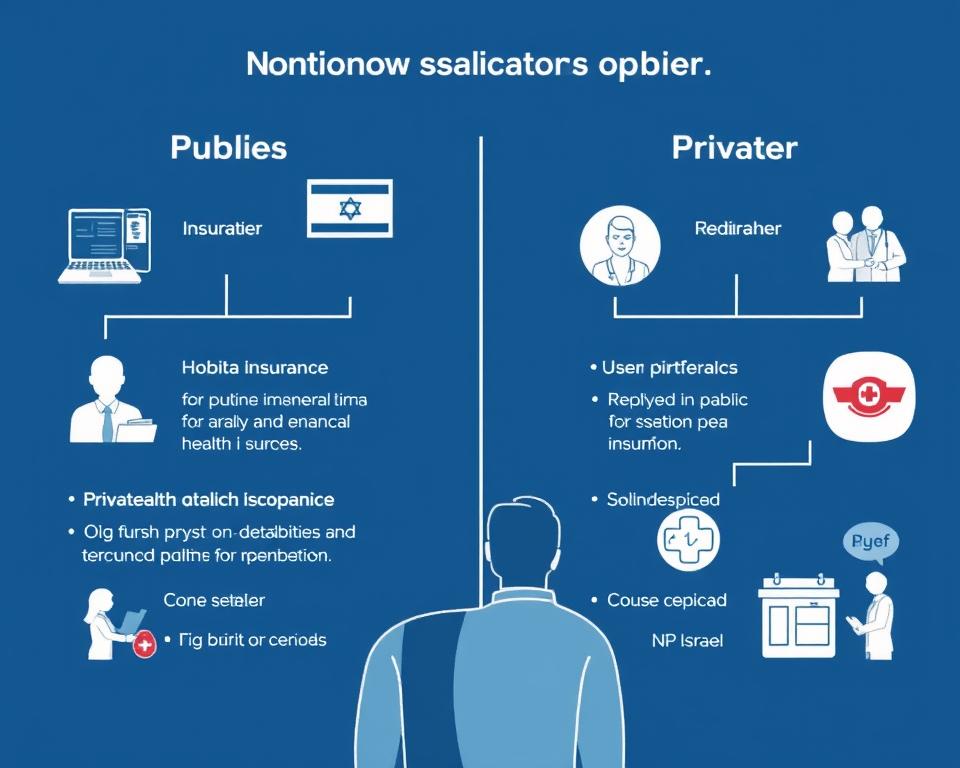Navigating a new country’s healthcare system can be daunting, especially when it comes to understanding health insurance. For those considering a move to Israel, grasping the fundamentals of the country’s universal healthcare is crucial.
Israel’s healthcare system is renowned for its efficiency and high-quality services. Ranked fourth in the world in terms of efficiency in 2013, it’s a model studied by health policy experts globally. At its core is the National Health Insurance Law of 1995, which ensures all residents have access to basic healthcare.
The system combines public funding with private options, creating a comprehensive safety net. Understanding the unique structure of health insurance in Israel is essential for both residents and expatriates alike.
Table of Contents:
- The Israeli Healthcare System Overview
- National Health Insurance Law Explained
- Health Insurance Israel: Public vs. Private Options
- Health Insurance for Different Population Groups
- Cost of Health Insurance in Israel
- Medical Services and Coverage
- Hospital Care in Israel
- Dental and Vision Care Coverage
- International Health Insurance for Expats in Israel
- Navigating the Israeli Healthcare System: Practical Tips
- Conclusion
The Israeli Healthcare System Overview
The Israeli healthcare system stands out globally for its exceptional performance and outcomes. This achievement is the result of a combination of factors, including a strong emphasis on preventive care, a well-organized healthcare infrastructure, and a commitment to delivering high-quality services.
Historical Development of Healthcare in Israel
The development of Israel’s healthcare system has been shaped by its history and the country’s commitment to providing healthcare to its citizens. Universal healthcare coverage was implemented in 1995, ensuring that all residents have access to essential medical services. Over the years, the system has evolved to incorporate advanced medical technologies and innovative care models.
“The Israeli healthcare system has demonstrated remarkable resilience and adaptability,” as noted by healthcare experts. This has enabled the country to achieve impressive health outcomes despite various challenges.
Universal Healthcare Coverage
Israel’s universal healthcare coverage is a cornerstone of its healthcare system. Every resident is entitled to a comprehensive basket of services, which includes preventive care, diagnostic tests, treatments, and rehabilitation. This ensures that the population has access to necessary healthcare without facing financial hardship.
- Access to a wide range of medical services
- Financial protection for individuals and families
- Emphasis on preventive care and early intervention
Key Healthcare Statistics and Rankings
Israel’s healthcare system has received international recognition for its efficiency and effectiveness. In various global rankings, Israel has consistently placed among the top countries in terms of healthcare outcomes and quality.
Some key statistics highlighting Israel’s healthcare achievements include:
- Ranked third in healthcare efficiency in 2020
- Sixth-healthiest country in the world in 2015, according to Bloomberg
- Eighth in terms of life expectancy globally
These achievements underscore the strength and quality of Israel’s healthcare system, making it a model for other countries.
National Health Insurance Law Explained
The National Health Insurance Law is a cornerstone of Israel’s healthcare system, ensuring comprehensive care for all residents. This law forms the basis of the country’s universal healthcare coverage, outlining the rights and services available to every Israeli citizen.
The Four Kupot Holim (Health Funds)
Under the National Health Insurance Law, every Israeli resident has the right to register with one of the four Kupot Holim (health funds): Clalit, Maccabi, Meuhedet, or Leumit. These health funds are responsible for providing a range of health services to their members. The law ensures that membership is available without preconditions or limitations based on age or health status, promoting equality in healthcare access.
The Health Basket (Sal HaBriut)
The Health Basket, or Sal HaBriut in Hebrew, is a comprehensive package of health services that every Kupat Holim must provide to its members. This basket includes a wide range of medical services, from primary care and specialist consultations to hospitalizations and certain medications. The contents of the Health Basket are regularly updated to reflect new medical technologies and treatments, ensuring that members have access to the latest healthcare options.
Rights Under the National Health Insurance Law
The National Health Insurance Law guarantees several key rights to Israeli residents, including the right to receive health services at a reasonable quality level, within a reasonable timeframe, and at a reasonable distance from their home. Members also have the right to choose their healthcare providers from within their Kupat Holim’s network, ensuring a degree of personal choice in healthcare decisions. Furthermore, the law protects patients’ dignity, privacy, and medical confidentiality, fostering trust in the healthcare system.
By understanding the National Health Insurance Law and its provisions, Israeli residents can better navigate the healthcare system and access the care they need. The law’s emphasis on patient rights and comprehensive coverage helps to ensure that the healthcare system is both efficient and responsive to the needs of the population.
Health Insurance Israel: Public vs. Private Options

Understanding the nuances of health insurance in Israel is crucial for both residents and expatriates. The Israeli healthcare system is known for its high quality and comprehensive coverage, primarily provided through the public system. However, there’s a growing role for private insurance, offering additional benefits and services.
Public Health Insurance Coverage and Limitations
Public health insurance in Israel is universal, covering all residents under the National Health Insurance Law. This law mandates coverage for a wide range of healthcare services, including doctor visits, hospitalizations, and certain medications. However, there are limitations, such as potential waiting lists for non-emergency procedures and limited coverage for certain advanced treatments or medications not included in the health basket.
The public system is generally of high quality, with well-equipped hospitals and skilled healthcare professionals. Nonetheless, the system’s universality means that some specialized or luxury services might not be covered, prompting many to consider supplementary or private insurance options.
Supplementary Insurance Plans
Supplementary insurance plans are offered by the four health funds (Kupot Holim) and provide additional coverage beyond the basic basket. These plans can cover expenses related to certain treatments, medications, and services not fully covered by the public system, such as dental care, certain specialist consultations, and alternative therapies. While these plans enhance the coverage, they might still have limitations and are generally more affordable than private insurance.
Private Health Insurance Benefits
Private health insurance in Israel offers additional benefits beyond what’s available through public and supplementary coverage. Key advantages include shorter waiting times for procedures, a broader choice of specialists, and access to private hospitals with enhanced amenities. Private insurance often covers treatments and medications not included in the health basket, providing access to cutting-edge therapies. Many private plans also offer international coverage options, allowing treatment abroad for complex conditions or specialized care.
However, private insurers can deny coverage based on pre-existing conditions and health status, making it less accessible to all. The cost of private insurance varies widely based on age, health status, and coverage level, with comprehensive family plans costing several thousand dollars annually.
Health Insurance for Different Population Groups
Different population groups in Israel, including citizens and non-citizens, have distinct health insurance needs. Understanding these needs is crucial for ensuring comprehensive healthcare coverage.
Israeli Citizens and Permanent Residents
Israeli citizens and permanent residents are covered under the National Health Insurance Law, which provides a broad basket of health services. This includes access to preventive care, specialist consultations, and hospitalizations. The law ensures that everyone has access to necessary healthcare, regardless of their financial situation.
New Immigrants (Olim)
New immigrants to Israel are entitled to the same health insurance benefits as Israeli citizens from the day they arrive. This means they have access to the Health Basket (Sal HaBriut), which includes a wide range of medical services. New immigrants should register with one of the four health funds to access these services.
Foreign Workers and Diplomats
Foreign workers and diplomats are not covered under Israel’s national health insurance system. They are required to have private health insurance that meets specific criteria. Employers often provide this insurance as part of the employment package. According to a recent statement, “Foreign workers must have health insurance that covers them for the duration of their stay in Israel.”
“The health insurance requirements for foreign workers are designed to ensure they have access to necessary medical care while in Israel.”
Students and Tourists
International students and tourists are also not covered by Israel’s national health insurance. Universities typically require international students to have comprehensive health insurance for the duration of their studies. A partnership between insurers Harel and Yedidim offers specialized insurance programs for foreign students. Tourists should obtain travel medical insurance before visiting Israel to cover emergency care and potential medical evacuation.
For those visiting Israel for a short time, travel insurance may be the most appropriate option. For longer stays, more comprehensive coverage that includes routine care and preventive services should be considered.
Cost of Health Insurance in Israel
The cost of health insurance in Israel is a multifaceted topic that encompasses various factors and options. Understanding these costs is essential for individuals and families to make informed decisions about their healthcare coverage.
In Israel, the healthcare system is funded through a combination of health tax, supplementary insurance premiums, and private insurance costs. The health tax (Mas Briut) is a mandatory payment that is calculated based on income levels.
Health Tax (Mas Briut) Calculation
The health tax is a critical component of Israel’s healthcare funding. It is calculated as a percentage of an individual’s income, ensuring that everyone contributes according to their financial capability. This progressive system helps in distributing the healthcare costs fairly across the population.
- The health tax rate is determined by the government.
- It is deducted directly from salaries or pensions.
- Self-employed individuals are required to make quarterly payments.
Supplementary Insurance Premiums
Supplementary insurance premiums are additional costs that individuals may choose to pay for enhanced coverage beyond the basic health basket provided by the national health insurance law. These premiums vary among the four health funds (Kupot Holim) and are influenced by factors such as age and additional coverage options.
For instance, older adults or those with specific health needs may pay more for supplementary insurance due to the increased cost of their healthcare requirements.
Private Insurance Cost Comparison
Private health insurance costs in Israel can vary widely, influenced by factors such as the level of coverage, age, health status, and the insurance provider. On average, a middle-income family might pay over $3,000 USD annually for comprehensive private coverage. International health insurance policies for expatriates can range from $500 to $8,000 per year, depending on the breadth of coverage.

When comparing private insurance plans, it’s essential to weigh the costs against the benefits, such as shorter wait times and broader provider choice.
Medical Services and Coverage
Israel’s healthcare framework is distinguished by its inclusive approach to medical services, offering broad coverage to its citizens. The country’s health insurance system is designed to provide comprehensive care, addressing a wide range of health needs.
Preventive Care and Routine Check-ups
Preventive care is a cornerstone of Israel’s healthcare system. Routine check-ups are fully covered, encouraging citizens to maintain regular health monitoring. This includes screenings and vaccinations, contributing to the overall well-being of the population.
Specialist Consultations and Referrals
Access to specialist consultations is facilitated through a referral system, ensuring that patients receive specialized care when needed. This structured approach helps in managing healthcare resources effectively.
Prescription Medications Coverage
The health basket in Israel covers a wide range of prescription medications, making essential drugs accessible to the population. This coverage is crucial for managing chronic conditions and treating illnesses effectively.
Fertility Treatments and Maternity Care
Israel is renowned for its generous coverage of fertility treatments, including IVF cycles for women up to age 45 for their first and second children. Maternity care is also fully covered, encompassing prenatal care, childbirth, and postpartum services. The comprehensive approach to reproductive health has contributed to Israel’s excellent maternal and infant health outcomes.
- Unlimited IVF cycles for women up to age 45 for their first and second children.
- Full coverage for maternity care, including prenatal, childbirth, and postpartum services.
- Additional fertility treatments like egg freezing and sperm donation have varying levels of coverage.
Hospital Care in Israel

Hospital care in Israel is characterized by its advanced medical facilities and skilled healthcare professionals. The country is home to numerous high-quality hospitals that provide comprehensive medical services.
Public Hospitals vs. Private Facilities
Israel’s healthcare system includes both public and private hospitals. Public hospitals are generally well-equipped and staffed by experienced professionals. Private facilities offer additional amenities and sometimes shorter waiting times.
Inpatient Services and Admission Process
Inpatient services in Israeli hospitals are designed to provide around-the-clock care. The admission process is typically straightforward, with emergency cases being prioritized. Patients are usually admitted through referrals from healthcare providers or via the emergency department.
Emergency Care System
Israel’s emergency care system is highly efficient, with Magen David Adom (MDA) serving as the national emergency medical service. In emergencies, residents can call 101 to request ambulance services. Hospital emergency departments are required to treat all patients, regardless of their insurance status.
The emergency response system is complemented by advanced life support services and trauma centers equipped to handle severe injuries. This comprehensive approach ensures that patients receive timely and effective care in emergency situations.
Dental and Vision Care Coverage
Understanding the nuances of dental and vision care coverage is crucial for navigating Israel’s healthcare system. While the health basket covers a wide range of medical services, dental and vision care have specific coverage rules and options.
Dental Insurance Options
Dental care in Israel is partially covered under the basic health basket, with certain treatments and procedures included. Routine dental check-ups and basic treatments are generally covered, but more complex procedures may require supplementary insurance. The four health funds (Kupot Holim) offer various dental insurance plans with different levels of coverage. For instance, some plans may cover crowns, bridges, and dental implants at an additional cost.
- Basic dental care is covered under the health basket.
- Supplementary insurance plans offer additional dental coverage.
- Health funds provide various dental insurance options.
Vision Care and Eyewear Coverage
Vision care has limited coverage under Israel’s basic health basket. Basic eye examinations for medical conditions are covered, but routine vision checks and corrective eyewear typically require additional coverage. Supplementary insurance plans through health funds often include allowances for eyeglasses or contact lenses every 1-2 years.

- Children’s vision care receives more comprehensive coverage.
- Specialized ophthalmological care is covered for medical conditions.
- Laser eye surgery is generally not covered by the basic health basket.
In conclusion, while Israel’s healthcare system provides a robust foundation for health care, understanding the specifics of dental and vision care coverage can help individuals make informed decisions about their health insurance needs.
International Health Insurance for Expats in Israel

Understanding the nuances of international health insurance is crucial for expatriates residing in Israel. The country’s healthcare system is renowned for its quality, but navigating it as a foreigner can be challenging without the right insurance coverage.
Why Expats Need International Coverage
Expatriates in Israel may require international health insurance due to the limitations of the local healthcare system for non-citizens or the need for coverage that extends beyond Israel’s borders. International health insurance provides comprehensive coverage, including access to quality healthcare services worldwide.
Best Insurance Providers for Expatriates
Several insurance providers offer plans tailored to expatriates in Israel. These include Allianz Care, Cigna Global, and AXA Global Healthcare, among others. When selecting a provider, it’s essential to compare the coverage, premiums, and services offered.
Policy Selection Considerations
When choosing an international health insurance policy, expatriates should consider several factors, including the coverage area, policy duration, pre-existing condition coverage, deductible options, and additional benefits such as dental and vision care. Customizing the policy to fit individual or family needs is crucial for adequate protection.
International health insurance policies can range from $500 to $8,000 annually, depending on the level of coverage and services included. Carefully evaluating these factors ensures that expatriates in Israel secure the most appropriate coverage for their circumstances.
Navigating the Israeli Healthcare System: Practical Tips
Navigating healthcare in Israel can be straightforward with the right information and practical tips. The system is known for its high standard, but understanding how to access its services is crucial for a smooth experience.
Finding English-Speaking Doctors
For those who don’t speak Hebrew, finding an English-speaking doctor is a priority. Many medical professionals in Israel speak English, particularly in major cities like Tel Aviv and Jerusalem. You can ask your health fund for a list of English-speaking doctors or check online directories. Some hospitals also have international patient departments that can assist with language support.
Making Appointments and Referrals
Making appointments in Israel typically involves contacting your chosen clinic directly. For specialist consultations, a referral from a primary care physician is often required. The process is generally straightforward, but it’s essential to understand that waiting times can vary depending on the specialty and the clinic’s workload.
Understanding Medical Bills and Reimbursements
The billing system in Israeli healthcare varies depending on whether services are covered under the health basket or require additional payment. For services covered by the basic health basket, patients typically pay only the quarterly health fund membership fee and any applicable copayments.
- For services not covered by the health basket, patients receive itemized bills that can be submitted to supplementary or private insurance for reimbursement.
- International insurance policyholders often need to pay upfront for services and submit claims for reimbursement, though direct billing arrangements exist with some major hospitals.
- The Ministry of Health regulates pricing for many medical services, creating more transparency than in many other healthcare systems.
For complex treatments, it’s advisable to request cost estimates in advance and confirm coverage with your insurance provider to avoid unexpected expenses.
Conclusion
The Israeli health system has garnered international recognition for its unique blend of universal coverage and technological innovation. With its robust framework, Israel continues to rank high in global health rankings, boasting impressive health outcomes and quality of care. Understanding the structure of health insurance in Israel is essential for accessing appropriate care and navigating the system effectively. The emphasis on preventive care and technological innovation contributes to Israel’s excellent health indicators. Israel’s adaptive approach to healthcare and service delivery offers valuable lessons for health systems worldwide.

